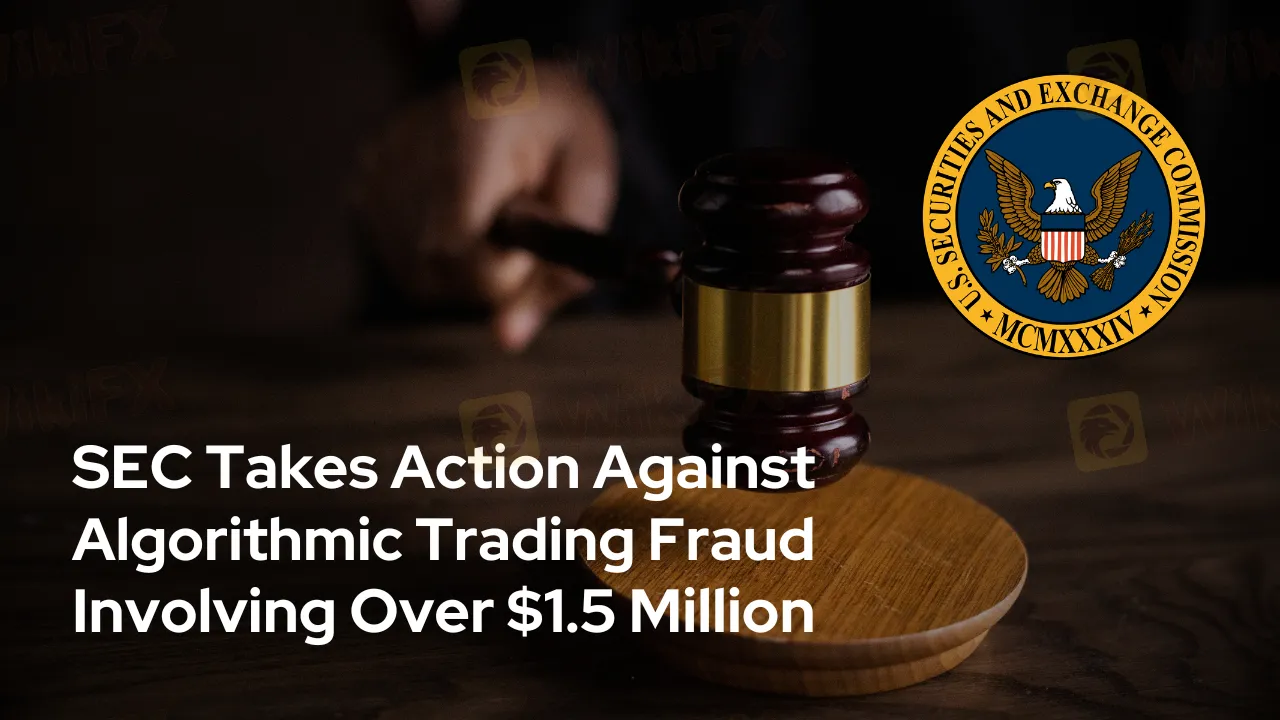简体中文
繁體中文
English
Pусский
日本語
ภาษาไทย
Tiếng Việt
Bahasa Indonesia
Español
हिन्दी
Filippiiniläinen
Français
Deutsch
Português
Türkçe
한국어
العربية
SEC Takes Action Against Algorithmic Trading Fraud Involving Over $1.5 Million
Abstract:The SEC charged Matthew Melton with fraud, alleging he misled investors about his algorithmic trading scheme, collecting over $3.4 million. Melton claimed his algorithm could generate 12% monthly returns but was unprofitable, misusing over $1.5 million for personal expenses and Ponzi-like payments.

In a significant move to safeguard investor interests, the Securities and Exchange Commission (SEC) has recently brought charges against Matthew Melton for defrauding investors through misleading representations related to his algorithmic trading scheme. This decisive action by the SEC underlines its commitment to uphold the integrity of financial markets and protect investors from deceptive practices.
Background of the Case
The case centers around Melton's algorithmic trading approach, specifically his Price Physics trading algorithm. From April 1, 2018, to October 31, 2020, Melton allegedly collected over $3.4 million from at least 23 investors, primarily based in Puerto Rico and sharing a common interest in outdoor activities. Melton's claim that his algorithm could generate consistent monthly returns of 12% was central to attracting these investments. However, contrary to his assertions, the SEC's complaint reveals that Melton's trading activities were consistently unprofitable.
Further complicating the issue, Melton is accused of misappropriating over $1.5 million of the invested funds. Instead of employing the funds as intended for algorithmic trading, he allegedly used them for personal expenses, including travel, sailing, and mortgage payments. This misuse of funds also involved Ponzi-like payments to other investors, a severe breach of trust and financial ethics.
SEC's Legal Actions
The SEC's complaint, filed in the United States District Court for the Southern District of New York, charges Melton with violations of federal securities laws. The Commission seeks extensive relief measures, including permanent injunctive relief, disgorgement with prejudgment interest, civil penalties, and an officer-and-director bar against Melton. This comprehensive legal action underscores the SEC's dedication to enforcing securities laws and ensuring fair play in the investment arena.

In a parallel development, the U.S. Attorneys Office for the Southern District of New York has announced criminal charges against Melton, highlighting the severity of the alleged misconduct.
The Role of the SEC
The Securities and Exchange Commission, as a federal agency, plays a pivotal role in regulating and overseeing the securities industry. Its mission is to protect investors, maintain fair, orderly, and efficient markets, and facilitate capital formation. The SEC's actions against fraudulent activities, like the case against Melton, are vital in maintaining investor confidence and the integrity of financial markets.
Conclusion
The SEC's action in the Melton case is a clear message to the investment community about the seriousness with which it approaches its mandate of investor protection. This case serves as a reminder of the risks involved in algorithmic trading and the importance of due diligence by investors. The SEC remains vigilant in its pursuit of those who seek to undermine the financial system through fraudulent activities.

Disclaimer:
The views in this article only represent the author's personal views, and do not constitute investment advice on this platform. This platform does not guarantee the accuracy, completeness and timeliness of the information in the article, and will not be liable for any loss caused by the use of or reliance on the information in the article.
Read more

Mumbai Police Nabs Black Paper Dollar Conversion Forex Scam Perpetrators: Check Out the Details
The crime branch of the Mumbai Police has nabbed a racket involved in duping people by claiming to convert black paper into dollars. Check this unique 24.7-lakh scam story.

Risk Involved with Cabana Capital – Every Trader Should Know
Cabana Capital has changed its name and logo, basically everything about its identity. This seems a bit suspicious, and it's something you should definitely be concerned about. In this article, you’ll learn about the red flags that every trader needs to watch out for.

CME International Records a Massive Jump in Forex Volumes
CME International recorded a record surge in its foreign exchange trading volumes during the second quarter. Check out its performance across products and markets.

Scam Brokers Exposed! FCA Warns Traders to Stay Safe
If you are into forex trading, you need to protect your money from investment scams. Many scam brokers are active in the market now. The FCA, a reputed financial regulator, has issued a list of unlicensed brokers you need to stay away from.
WikiFX Broker
Latest News
What is a Pip in Forex?
xChief: A Closer Look at Its Licenses
FXTRADING.com: A Closer Look at Its Licenses
New to Forex Trading in India? Here's How You Can Start and Maximize
Intel spins out AI robotics company RealSense with $50 million raise
Tom Lee's Granny Shots ETF is crushing the market and raking in cash
Risk Involved with Cabana Capital – Every Trader Should Know
XTB Hack 2025: Major Security Breach Exposes Client Accounts
Nvidia's Jensen Huang sells more than $36 million in stock, catching up with Warren Buffett in net worth
These are America's 10 weakest state economies most at risk in a recession
Currency Calculator


